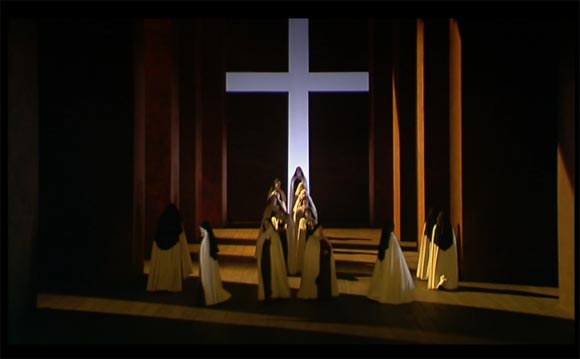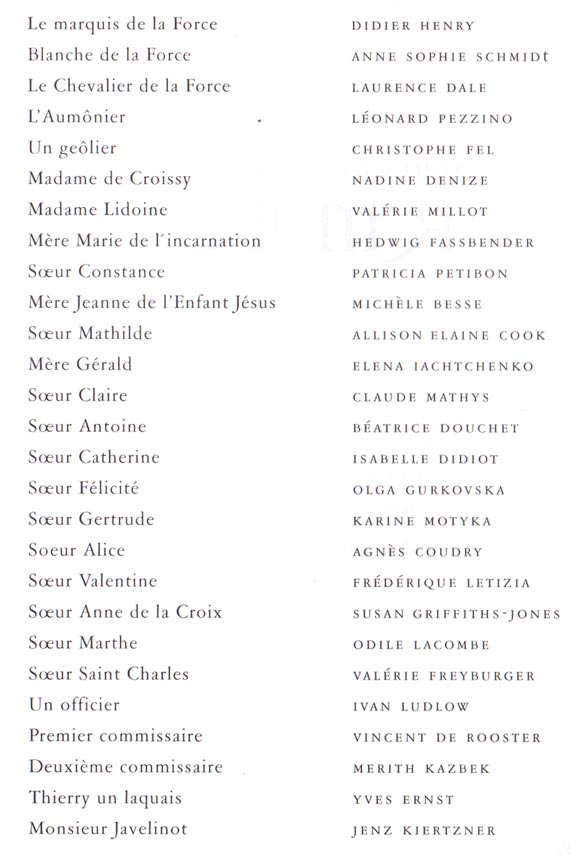Nest season the Canadian Opera Company is presenting a production of Poulenc’s Dialogues des Carmélites. It’s not a work I’ve had any exposure to and it sounded enough like Catholic snuff porn for me not to have bothered before. However, in the interests of furthering my education I got my paws on the library copy of DVD of a 1999 production from Opéra National du Rhin. I actually ended up quite liking the piece though the libretto might well have been written by Gide in one of his darker moments. The score is so tonal that it could almost have been written a hundred years earlier but it’s pleasant enough in a movie soundtrack sort of way. The production in question, by Marthe Keller, is very restrained. Much of the time it’s quite dark with very little happening. The drama is all in the words and expressions of the singers which must have made it quite hard to appreciate from the cheap seats. It’s also very traditional and period in costume and set design while remaining essentially simple. Given that most of the “action” is a series of dialogues that could have been lifted from a theology text this isn’t a bad set of choices. The final scene is almost impossible to stage literally as it involves the mass guillotining of the nuns. Here it’s handled effectively enough by having the nuns step forward in turn and collapse on stage to the successive sounds of the guillotine falling. The final reconnection of Blanche and Constance is really quite affecting.  The cast is huge (full list below)
The cast is huge (full list below)  There are a few key roles that have to convince for the piece to work. Foremost among these is Blanche de la Force aka Soeur Blanche de l’Agonie du Christ, here played by Anne Sophie Schmidt. She’s a character of deep religious devotion but also getting on for batshit insane. It’s not an easy role to play. Schmidt is really convincing in what could be a bit of a cardboard cutout role if not handled carefully. She also sings very well though occasionally sounds a bit strained in the upper register. The other young nun is Soeur Constance, a very optimistic young lady, played utterly charmingly by Patricia Petitbon. There are also lots of older nuns. I had to keep looking up who was who because it’s a bit like trying to pick out a suspect in a penguin identity parade. The important one’s are the old prioress (Nadine Denize), who dies in the first act, Blanche’s mentor, Mère Marie (Hedwig Fassbender), and the replacement prioress, also Mère Marie (Valérie Millot). All three ladies play their parts convincingly and sing appropriately for the character. Among the men, the stand out for me was the Aumônier of Léonard Pezzino who has a lovely voice. Really though, Blanche aside, this is an ensemble piece with no real opportunities for vocal fireworks. Here the ensemble worked well and was well supported by Orchestre Philharmonique de Strasbourg under Jan Latham-Koenig.
There are a few key roles that have to convince for the piece to work. Foremost among these is Blanche de la Force aka Soeur Blanche de l’Agonie du Christ, here played by Anne Sophie Schmidt. She’s a character of deep religious devotion but also getting on for batshit insane. It’s not an easy role to play. Schmidt is really convincing in what could be a bit of a cardboard cutout role if not handled carefully. She also sings very well though occasionally sounds a bit strained in the upper register. The other young nun is Soeur Constance, a very optimistic young lady, played utterly charmingly by Patricia Petitbon. There are also lots of older nuns. I had to keep looking up who was who because it’s a bit like trying to pick out a suspect in a penguin identity parade. The important one’s are the old prioress (Nadine Denize), who dies in the first act, Blanche’s mentor, Mère Marie (Hedwig Fassbender), and the replacement prioress, also Mère Marie (Valérie Millot). All three ladies play their parts convincingly and sing appropriately for the character. Among the men, the stand out for me was the Aumônier of Léonard Pezzino who has a lovely voice. Really though, Blanche aside, this is an ensemble piece with no real opportunities for vocal fireworks. Here the ensemble worked well and was well supported by Orchestre Philharmonique de Strasbourg under Jan Latham-Koenig.  I’m not sure how I feel about Don Kent’s video direction. He starts off with artsy stuff in the title sequence and it’s not entirely clear where the credits end and the piece begins. There is something to be said for showing the conductor going to the pit and starting the show. He stays very close in on the singers most of the time which normally drives me nuts but here seems unavoidable and, to be fair, when there is a stage tableau to be seen we see it. There are also grainy black and white images used during some of the orchestral interludes. It’s not entirely clear whether they are projections in the house or inserts in the video. I think the latter but I can’t be sure. It’s perhaps best to enjoy this as a video and not worry too much about how well it reflects what is going on on stage.
I’m not sure how I feel about Don Kent’s video direction. He starts off with artsy stuff in the title sequence and it’s not entirely clear where the credits end and the piece begins. There is something to be said for showing the conductor going to the pit and starting the show. He stays very close in on the singers most of the time which normally drives me nuts but here seems unavoidable and, to be fair, when there is a stage tableau to be seen we see it. There are also grainy black and white images used during some of the orchestral interludes. It’s not entirely clear whether they are projections in the house or inserts in the video. I think the latter but I can’t be sure. It’s perhaps best to enjoy this as a video and not worry too much about how well it reflects what is going on on stage.  Technically this isn’t a bad DVD. The 16:9 picture is quite decent and the LPCM Stereo sound is OK though not in the class of the best recent releases. The only subtitle options are English and Chinese. There is a trilingual (English, French, German) booklet with track listing, synopsis and a brief historical essay. The only real competition for this work on DVD is a much starrier La Scala cast in the Robert Carsen production that will be seen in Toronto so this Strasbourg version is probably worth a look for anyone with a serious interest in the work. There’s also an old (1984) Opera Australia version sung in English still in the catalogue.
Technically this isn’t a bad DVD. The 16:9 picture is quite decent and the LPCM Stereo sound is OK though not in the class of the best recent releases. The only subtitle options are English and Chinese. There is a trilingual (English, French, German) booklet with track listing, synopsis and a brief historical essay. The only real competition for this work on DVD is a much starrier La Scala cast in the Robert Carsen production that will be seen in Toronto so this Strasbourg version is probably worth a look for anyone with a serious interest in the work. There’s also an old (1984) Opera Australia version sung in English still in the catalogue.
operaramblings
John's opera ramblings

Pingback: Revelatory Carmélites from La Scala | operaramblings